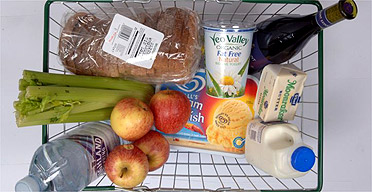
It might be every child's favourite treat, but ice cream is officially on the slide. Yet wholemeal bread is definitely back in vogue - poised to become more popular than sliced white loaves - according to an annual survey that provides a snapshot of the nation's weekly shopping basket.
Healthy options such as fresh fruit and vegetables, wholemeal bread, yoghurt, and semi-skimmed milk are on the rise.
Consumption of alcohol, white bread and ice cream - down more than 8% - are decreasing. The report exposes wide variations between different parts of the country and different income groups.
In the Yorkshire and the Humber area people spend more on alcohol. Londoners spend £9.65 eating out every week, more than anywhere else in the UK. Ian Tokelode, a spokesman for the Food Commission, an independent organisation that campaigns for healthy food, described the increased public appetite for healthy food as a "snowball that keeps rolling".
"People have just become much more interested in food and nutrition. It's been bubbling under for a few years now but it has broken through into the mainstream."
He believes the turning point came with food scares such as mad cow disease. "It made people think about the food they were eating. Previously we just sort of accepted what was on our plate and didn't think about it too much." The report, Family Food 2004-05, was published yesterday by the Department for Environment, Food and Rural Affairs.
It includes estimates of food and drink consumption inside and outside the home. Across the country the average weekly food bill is £34.31.
According to the survey, richer households eat less sugar, fats and milk, and more fresh fruit, fresh vegetables and cheese. The average person in the lowest 20% income bracket eats 202 grams of sugar and preserves a week compared with 98 in the highest 20%.
A spokesman for the National Consumer Council said its research backed up the finding that more people are eating healthily, but there are still gaps between rich and poor. "We found that two-thirds of adults have changed their eating habits or activity levels in the past year in order to lead a healthier lifestyle. But our research also shows that poorer households are less likely to have changed their habits and are most at risk of poor diet."
A spokesman for Tesco, Britain's largest supermarket chain, said the company had made fresh fruit and vegetables more affordable.
Food campaigners are concerned that consumers might not always be able to recognise the healthiest choices because of poor labelling. "Some manufacturers have taken steps to improve the quality of their food. Others have simply repackaged and to be honest are misleading consumers to some extent," Mr Tokelode said. He cites the food industry's rejection of a voluntary traffic light labelling system proposed by the Food Standards Agency as proof that it is not doing enough.]
"Instead they have come up with a myriad of different labelling schemes. So at the moment things are very confusing," he said.

